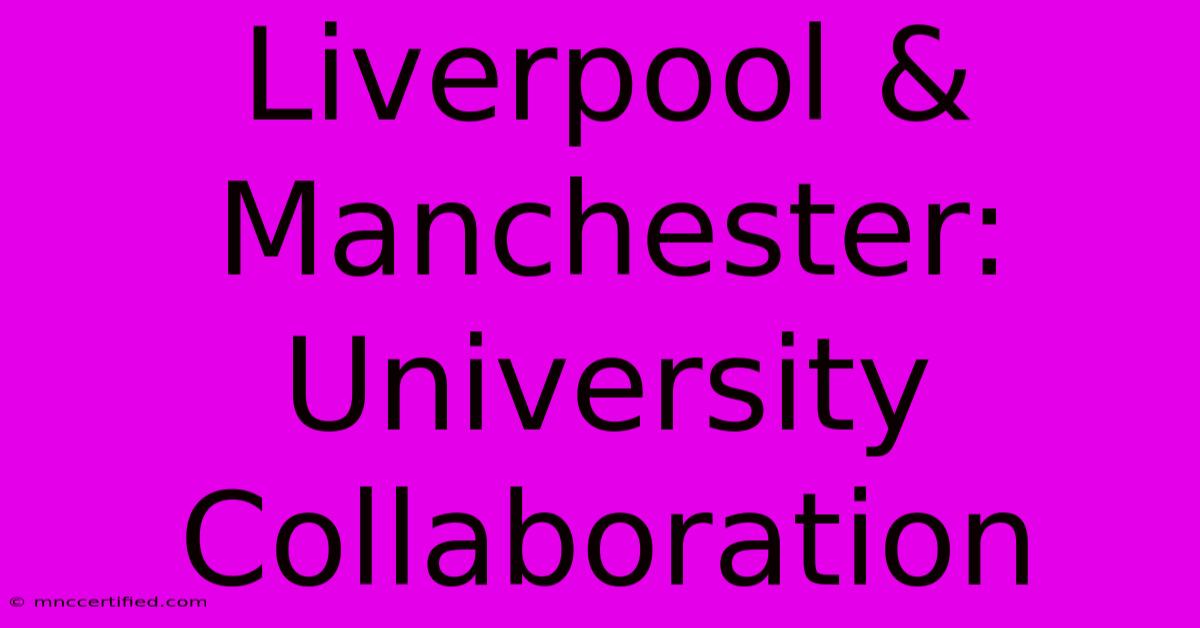Liverpool & Manchester: University Collaboration

Table of Contents
Liverpool & Manchester: A Powerhouse of University Collaboration
The North West of England boasts a rich tapestry of academic excellence, with Liverpool and Manchester standing out as two of its brightest stars. While often viewed as rivals in football, these cities share a powerful collaborative spirit in the realm of higher education, forging partnerships that benefit students, researchers, and the wider community. This article explores the multifaceted collaborations between universities in Liverpool and Manchester, highlighting their impact and future potential.
A History of Successful Partnerships
The collaboration between Liverpool and Manchester universities isn't a recent phenomenon. Decades of shared projects, research initiatives, and student exchange programs have built a strong foundation for ongoing success. This historical context is crucial to understanding the current landscape of cooperation.
Key Areas of Collaboration:
-
Research & Innovation: Joint research projects are a cornerstone of this collaboration. Universities often pool resources and expertise to tackle complex challenges in areas like healthcare, sustainable technology, and digital innovation. This collaborative approach attracts significant funding and leads to groundbreaking discoveries. Examples include joint bids for large-scale research grants and the sharing of specialized equipment and facilities.
-
Student Exchange Programs: Students from both cities benefit from opportunities to study at partner institutions, broadening their horizons and enhancing their CVs. This exchange fosters a sense of community and shared experience, creating valuable professional networks that extend beyond graduation. These programs often include joint lectures, workshops, and social events to encourage interaction and collaboration.
-
Knowledge Transfer Partnerships (KTPs): These partnerships bridge the gap between academia and industry, connecting businesses with university expertise to drive innovation and economic growth. Liverpool and Manchester universities frequently work together on KTPs, leveraging their combined strengths to support regional businesses and contribute to the economic prosperity of the North West.
-
Joint Degree Programs: Some universities have even developed joint degree programs, offering students a unique educational experience that combines the strengths of both institutions. This approach allows for specialized learning across disciplines and provides students with a broader skillset, making them highly competitive in the job market.
The Benefits of Collaboration
The synergy between Liverpool and Manchester universities yields numerous benefits:
-
Enhanced Research Output: Pooling resources leads to higher-quality research and more impactful publications, boosting the international reputation of both cities' higher education sectors.
-
Improved Student Experience: Access to a wider range of courses, facilities, and networking opportunities enriches the student experience significantly.
-
Economic Growth: Knowledge transfer and innovation stimulated by collaboration contribute to the economic development of the wider region. This attracts investment and creates jobs.
-
Stronger Regional Identity: Collaboration fosters a sense of collective identity and shared purpose, enhancing the overall reputation of the North West as a center for learning and innovation.
Challenges and Future Directions
While collaboration is thriving, challenges remain. Competition for funding and resources is a constant factor. Maintaining effective communication and coordination across multiple institutions requires ongoing effort.
Future directions for collaboration could include:
-
Increased focus on interdisciplinary research: Addressing complex global challenges demands collaboration across traditional disciplinary boundaries.
-
Developing more robust student exchange programs: Expanding the scope and accessibility of exchange programs to a wider range of students.
-
Strengthening industry partnerships: Focusing on translating research findings into real-world applications through stronger industry collaborations.
-
Leveraging digital technologies: Employing innovative digital tools to enhance collaboration and communication across institutions.
Conclusion: A Bright Future for Collaboration
The ongoing collaboration between Liverpool and Manchester universities is a testament to the power of shared purpose and mutual benefit. By building on existing successes and addressing emerging challenges, these institutions can further solidify their positions as leading centers of higher education, fostering innovation and driving economic growth in the North West and beyond. This collaborative spirit is not just beneficial for the universities themselves, but for the entire region, contributing significantly to its economic prosperity and international standing. The future of this partnership looks bright, promising continued advancements in research, education, and economic development.

Thank you for visiting our website wich cover about Liverpool & Manchester: University Collaboration. We hope the information provided has been useful to you. Feel free to contact us if you have any questions or need further assistance. See you next time and dont miss to bookmark.
Featured Posts
-
Best 1031 Exchange Investments
Nov 28, 2024
-
Oasis Reunion Ticket Issues Ticketmaster
Nov 28, 2024
-
Real Madrid Vs Liverpool Confirmed Starting Lineups
Nov 28, 2024
-
Cosmetic Bonding Before After
Nov 28, 2024
-
Seattle Real Estate Investment
Nov 28, 2024